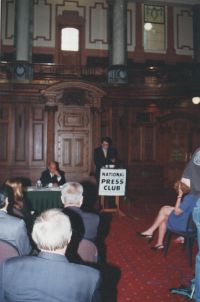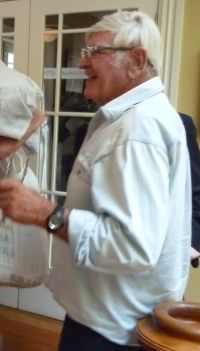Randal Jackson Was the Last of His Era

The death after a short illness of Randal Jackson ended a career spanning half a century. His death put the final full stop on an era of journalism. He was the last of the street- level reporters who followed the story wherever it took him regardless of the day, place or the hour.
Randal Lee Jackson was born into a determinedly Labour Party household. He was named nonetheless after an eminent surgeon of the time.
At the earliest opportunity Jackson signed on under the old apprenticeship scheme with the Evening Post in Wellington. With its strong sports emphasis the Evening Post was also to present Jackson with plenty of opportunity for his own sporting passions. He continued to play rugby actively well into his 50s. Later still, he would turn out on the field for any cricket team that called him.
This was the epoch of the high water mark of horse racing which was a huge feature in the daily press of this time and which spawned numerous specialist periodicals. With his nimble mind and his ability with permutations and combinations Jackson was to make his mark in what was also a compelling pastime.
Seeking wider fields he transferred to Australia where he further honed his craft skills in all aspects of reporting. Returning to New Zealand, Jackson sought further challenges and he proceeded now to chance his arm in the more entrepreneurial aspects of journalism and publishing. The results were mixed.
It was now though that the defining opportunity of his career was to present itself in the form of IT journalism. He signed on with Computerworld which in several forms and under several proprietors was to remain his journalistic mother ship.
He became the signature IT journalist of the era bringing to this specialist sector the skills he had acquired as a general reporter, and, as it turned out, a racing reporter as well. He was on top of every major IT story from INCIS to Novopay.
He saw these and other such sagas in terms of track and turf. The IT implementations so often looked winners, paraded on the field as winners. But somehow once the starting gate was up so many with their jockeys and trainers revealed themselves as money-guzzling nags requiring immense additional infusion from the punter-taxpayers in order to eventually flog across the finishing line.
Jackson's full ability as a journalist flowered too under the editorship of Don Hill on CIO a glossy full colour magazine in the Computerworld stable. It was here that Jackson was able to give full rein to his grasp of technology in relation to social and commercial imperatives.
An unreconstructed fellow, Jackson's preferred place of business in later years was the smokers' balcony of Wellington's D4 Irish Bar the natural confluence of those who make the news and those who report it. By now a storied figure himself, there he would sit at the same corner table and on the same seat, looking out over his beat on Featherston Street.
He was thus a fixed point in the shifting sands of the capital's information business. People would come and go all day long, Jackson listening impassively, venturing an opinion or comment here and there.
Many assumed that Jackson's shunning of things like Facebook, Twitter, and LinkedIn meant that in a practical sense he was not technical. The truth was that he needed to deal with people directly, in person. He savoured the nuance of the personal encounter and what it revealed.
He was under full power until just a few days before his death. He will be remembered for his diligence, precision, generosity of spirit and for his sustained ability to listen to someone for a long period of time without any interruption at all.
He never wanted to get in the way of a story.
He is survived by a daughter and a son.
















